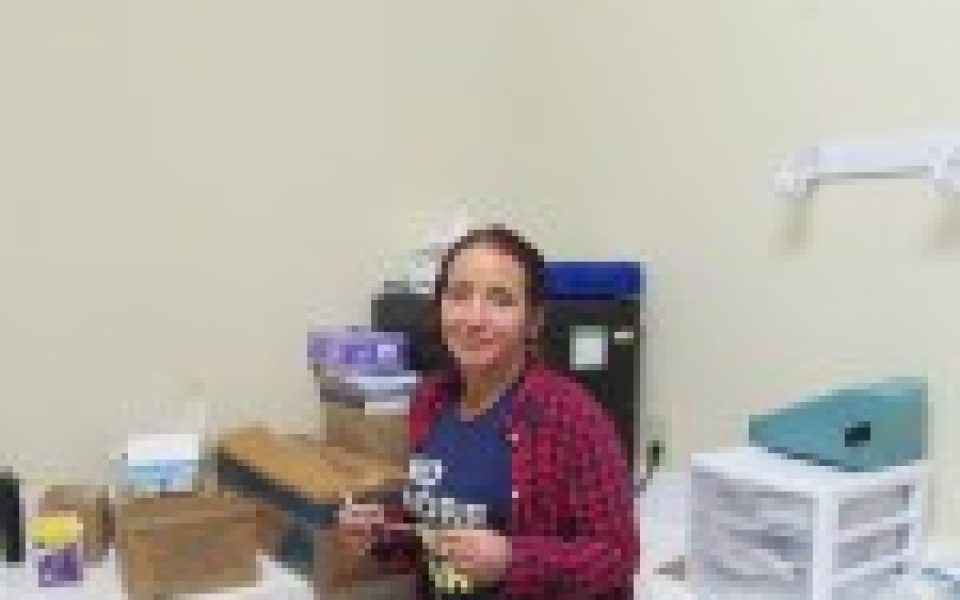In the beginning, Louise Beale Vincent operated a clean syringe exchange out of her home, but since she was occasionally using heroin herself, the police failed to appreciate the social service function of the project and raided the house she shares with her 75-year-old mother.
Vincent is a pioneer in the harm-reduction movement in Greensboro, part of a statewide network that has sprung up over the past decade to provide drug users with clean needles, distribute Naloxone to reverse overdoses and offer free testing for HIV and Hepatitis C.
“We had Naloxone early on,” Vincent recalled. “We got a small supply from a source in Chicago before anyone had heard about it. If we got a call about an overdose we jumped in the car and our crew drove over there. It was renegade early on. I was actively using at the time.”
By the summer of 2016, around the time the state General Assembly passed legislation legalizing needle exchanges, Vincent’s outfit Urban Survivors Union had set up shop in an office park upstairs from the Guilford County Democratic Party headquarters on Meadowview Road in Greensboro. It wasn’t a great fit: The party volunteers weren’t all that thrilled to see people carrying boxes of syringes through the building while they were trying to conduct voter registration drives, Vincent said. By November, Urban Survivors had relocated to its current location, a storefront on Grove Street next to the Peoples’ Market & Gardens in Glenwood.
Vincent’s aim with Urban Survivors is to empower drug users to make decisions about their lives and their health.
“I give someone some Naloxone — they come back and they say, ‘You’re never going to believe this,’” Vincent said. “I say, ‘I bet I do.’ They say, ‘It wasn’t more than five minutes after they overdosed; they came right back.’ They say, ‘I did something. I’m not this piece of s***.’ It feels good to hear people say, ‘Louise, you’ve affected so many people in a good way.’ Because I’ve been hearing for years about all the people I’ve affected in a negative way.”
Wearing a T-shirt declaring “No more drug war” during a recent cookout and open house at Urban Survivors, Vincent held forth on her view that conventional treatment programs harm addicts by isolating them and reinforcing a sense of shame. Two women gravitated to her orbit. After listening for a couple minutes, one of the women, wearing a zippered hoodie and a cross around her neck, felt emboldened to speak.
“I was on Rock 92 for a couple years for being the biggest con artist in Greensboro for approaching people in parking lots,” she said. “It wasn’t like I was selling my body; I was just asking for money.”
“We feel really s***ty about everything,” Vincent responded. “I would tell myself this has got to stop. Then I would use a s***load of drugs to feel better.”
Across the state people like Vincent are cultivating genuine relationships with users to literally save lives by making sure they have clean needles when they inject drugs, and distributing Naloxone kits to reverse overdoses. The Urban Survivors storefront on Grove Street is one among a handful of important staging areas across the state that help reach users from the cities to the most rural counties.
“Vance County is a distribution hub for heroin,” said Loftin Wilson, who conducts HIV and Hepatitis C testing at Urban Survivors and works at a needle exchange in Durham. “It’s economically depressed. The choices are to move out, sell heroin or work at Walmart. People come there to buy heroin, so there are a lot of overdoses.
“We flooded that county with Naloxone,” he continued. “We did outreach in pawnshops. I love doing outreach in rural areas. In Durham, you can pretty much show up at a street corner and find people. It’s a little more challenging in a rural area. You have to be tapped into people’s kinship networks.”
The most effective outreach is done by people with close connection to addiction, said Robert Childs, executive director of NC Harm Reduction.
“Now we’re shifting to having people who are directly affected be our primary Naloxone distributors — people who have lost a kid or somebody who is still a drug user,” Childs said. “We were using public health nerds, but we’re shifting away from that.”
“They’re eager, but not so effective,” Wilson added. “Creating a rapport — not so much.”
The woman who had been the butt of jokes on Rock 92 got up to take a cell phone call, and Vincent went to check on a volunteer who was grilling hamburgers and hotdogs behind the building.
“If they would use us, we could fix the world,” Vincent said. “Give us a project with a prize at the end, and we could come up with the solution for the world’s economy.”
Join the First Amendment Society, a membership that goes directly to funding TCB‘s newsroom.
We believe that reporting can save the world.
The TCB First Amendment Society recognizes the vital role of a free, unfettered press with a bundling of local experiences designed to build community, and unique engagements with our newsroom that will help you understand, and shape, local journalism’s critical role in uplifting the people in our cities.
All revenue goes directly into the newsroom as reporters’ salaries and freelance commissions.


Leave a Reply